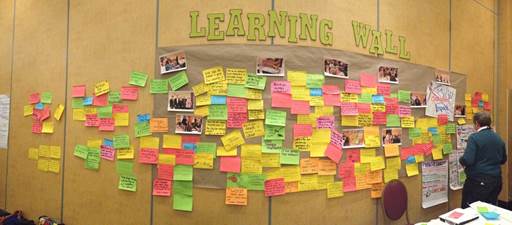Think about the last time you contributed to a positive change. What made you care enough to put in the effort? How did you learn what might help? Did it begin by hearing – and really listening – to a story?
Last month, I participated in Champions for Change: Leading a Backbone Organization for Collective Impact. This dynamic workshop, hosted by the Tamarack Institute and FSG in Toronto, brought together 150 leaders of backbone organizations from around Canada (and some from the U.S.). From the start, the energy was incredible. These were leaders of organizations that had taken on significant responsibility to catalyze long-term systems change in their communities. Given the tremendous complexity of their work, I expected them to be exhausted. I quickly learned they were anything but.
Participants were grouped into “pods,” or mini learning communities. As we engaged in a variety of activities, it was clear that attendees found tremendous value in sharing their stories. At lunch, I joined a group discussing the benefits and challenges of partnering with other efforts focusing on similar issues. Supporting mutually reinforcing activities and reducing duplication of effort might sound straightforward, but the reality is that developing trust and aligning multiple interests is pretty complex. Sharing with each other yielded a robust discussion and a more nuanced understanding of what it means to work with communities, for communities. We often needed more time between activities because the dialogues were so engaging we didn’t want to stop. In fact, on the second day, some pods continued talking until nearly 11pm – after having started the day with breakfast at 7:30am!
Immediately after the workshop, I flew to Savannah, Georgia. I was visiting one of 13 sites being supported by Lumina Foundation to apply collective impact approaches toward Latino student success. While there, we met Rolando Zenteno, a 4.0 student in his first year at Armstrong University. Rolando dreams of becoming a journalist so he can share “stories of people who otherwise may not be heard.” He also described how hearing others’ experiences changed his own life. In high school, he met Nick Valencia, a CNN reporter who became a key role model. Rolando saw some of himself in Nick’s background, and making that connection “changed [his] life.” Driven by his vision, Rolando secured college admission and won scholarship funds. He stressed the importance of sharing stories with other students who may not be sure about college. “Sometimes they just need to see that someone who looks like them made it,” he noted. “I’d tell my story… you have to make it personal. You can make that connection, make them identify with you – they just need to know it’s possible.”
As I headed home, the importance of storytelling (and listening) rang in my ears. In Toronto, exchanging stories led to nuanced insights about different ways to catalyze community change. In Savannah, Rolando’s story helped us understand approaches to supporting Latino students and showed that taking the time to get to know just one other person can have a tremendous, even unanticipated, impact. Collective impact is by definition messy, emergent, and complex. By creating connections and sharing our experiences, we can continue to adjust our paths and improve the way we work together. So I’m quite excited that FSG, the Aspen Institute Forum for Community Solutions, and others are developing a partnership to create knowledge, networks, and tools that accelerate the adoption of collective impact, promote success of community efforts, and foster a field of practice. Exchanging stories about our experiences can help all of us continue to learn and adapt in pursuit of greater impact.

